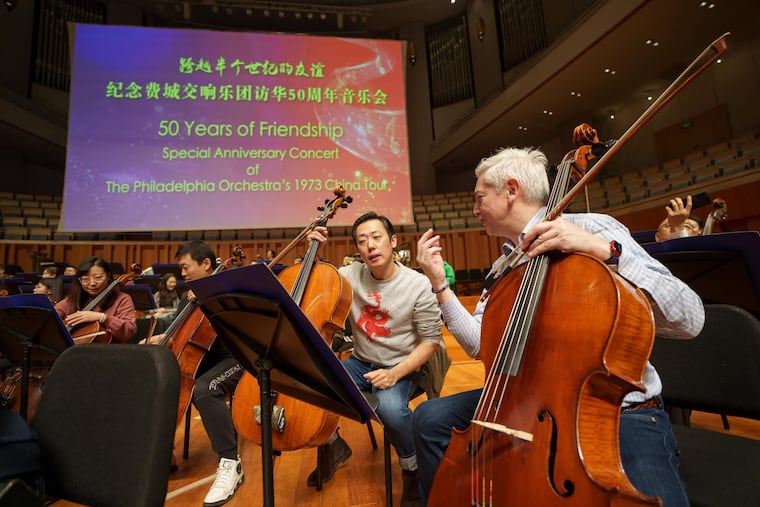The Philadelphia Orchestra is going back to China for the first time since before the pandemic
This will be the orchestra's 13th visit to China — more than any other American orchestra.

After scrapping its 50th anniversary tour of China in 2023, the Philadelphia Orchestra is picking up where it left off. The full ensemble will travel to China later this month — its 13th visit, the most of any American orchestra.
The orchestra’s 1973 Nixon-era visit helped to open China to the West and became a symbol for the power of cultural diplomacy, a dynamic that continues today.
“Since we were last in China as a full orchestra in 2019, we’ve received letters from President Xi Jinping, President Biden, and Secretary of State Antony Blinken, encouraging the Philadelphia Orchestra’s activities in cultural diplomacy, in investing in the power of music to bring people together,” said Matías Tarnopolsky, president and CEO of the Philadelphia Orchestra and Kimmel Center, Inc. “So in that regard, there’s a diplomatic objective.”
The orchestra’s eight concerts in China begin Oct. 31 in Beijing’s National Centre for the Performing Arts and continue with more Beijing concerts and performances in Tianjin and, for the first time, Chengdu and Haikou.
Philadelphia Orchestra Yannick Nézet-Séguin had been slated to lead the 2023 tour, which was canceled because of difficulties around COVID protocols in China. This fall’s concerts will be conducted by principal guest conductor Marin Alsop and feature pipa player Wu Man and pianist Haochen Zhang as soloists.
Although the 2023 tour was canceled, a group of 14 Philadelphia Orchestra musicians visited China that year to play in orchestras and lead master classes.
The tour of the full orchestra ends Nov. 10, after which a group of orchestra musicians (perhaps eight) will continue on in Shanghai, Wuxi, and Nanchang for additional residency activities. The orchestra will travel from Philadelphia International Airport to Beijing and throughout China on a charter Boeing 787-900 being provided by Hainan Airlines.
Relations between China and the U.S. have been tense in recent years — especially around issues of trade, technology, human rights, and defense — and orchestra and U.S. officials have no illusions about the extent to which the orchestra’s presence can influence the course of larger events.
Still, warm feelings do percolate up to the highest levels, as the U.S. ambassador to China, R. Nicholas Burns, said in an interview with The Inquirer last year.
“I was in San Francisco with President Biden for the meeting with President Xi, and President Xi gave a speech the evening of the meeting with President Biden where he mentioned the Philadelphia Orchestra as one of the initiatives that had produced a better climate in the relationship,” he said.
“The U.S.-China relationship, while we’re very competitive and we disagree on a lot, our people should be connected. And there’s no better way to do that than through the arts and music,” Burns said.
It’s always a difficult time [in U.S-China relations],” said Tarnopolsky. “But let’s think about what does work. And what does work is bringing beautiful music performed by the extraordinary musicians of the Philadelphia Orchestra to full concert halls all over China to enthusiastic audiences. What works is musicians sitting down with young Chinese musicians in schools, community settings, universities, and civic centers and making music.”
The orchestra tour promises to be historic, but this time for what will be going on back home. A group of musicians plan to drop off their ballots at City Hall before they leave, and the orchestra plans to host a gathering in Chengdu to watch election results.
Says Tarnopolsky: “I think it heightens our role as global cultural ambassadors that we’re there at a moment of great import for our own country as well.”